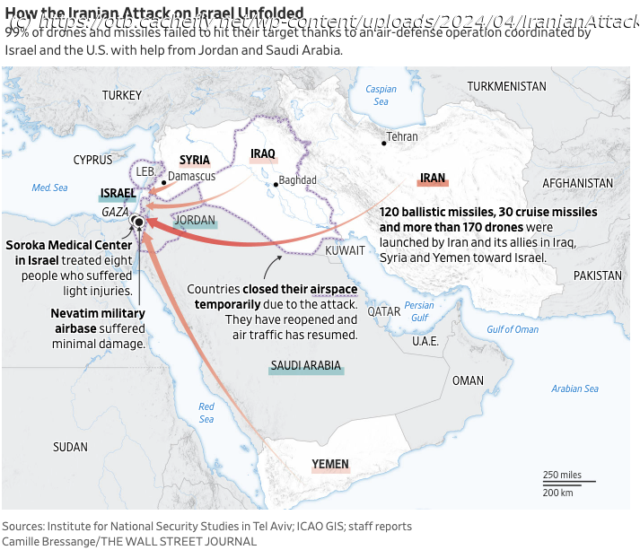Two related questions.
The early speculation on Iran’s attack on Israel was that it was a shot across the bow for the domestic audiences that was intended to fail in order to avoid massive escalation. That may well be mistaken.
SEMAFOR‘s Jay Solomon (“Iran sought mass casualties in Israel strike, U.S. officials say“):
Iran’s weekend aerial attack on Israel was designed to cause mass casualties and infrastructure damage, senior U.S. officials said, an assessment that complicates deliberations on how to respond to Tehran and its military allies in the coming weeks.
The Biden administration on Sunday hailed a unified defense of Israel that included U.S., U.K. and French air power and allied Arab states, such as Jordan. Their anti-drone and anti-missile capabilities, combined with Israel’s Iron Dome air defense system, shot down 99% of the more than 300 munitions Tehran and its proxies fired into the Jewish state from Iran, Iraq, Syria and Yemen on Saturday.
Senior U.S. officials said neutralizing the assault was a strategic victory for Israel and its partners, and opens a window to de-escalate tensions in a Middle East region already on edge from Israel’s six-month war in the Gaza Strip. Iran’s operation came in response to Israel’s April 1 attack on an Iranian diplomatic mission in Damascus that killed two Iranian generals.
“With the support of a number of partners, including the U.K. and France, the United States enabled Israel to spectacularly defeat this unprecedented attack,” a senior White House official said on Sunday. “[The Iranians] were clearly intending to destroy and to cause casualties. That was their intent.”
Iranian diplomats and military officials said on Saturday that they weren’t seeking to launch new strikes, provided there were no Israeli reprisals. “The matter can be deemed concluded,” Tehran’s United Nations mission said in a statement.
But Israeli government officials said that Tehran had crossed a clear red line by attacking Israel directly from Iranian soil for the first time in history. They also said the nature of the targets — believed to be major civilian areas and military infrastructure —required a response if their country is to restore deterrence against Iran and its regional allies.
Yaroslav Trofimov, the Chief Foreign-Affairs Correspondent for WSJ (“Analysis: Israel Repelled Iran’s Huge Attack. But Only With Help From U.S. and Arab Partners.“) adds:
Saturday’s Iranian strike on Israel was huge by any standard. Tehran launched more than 170 explosive-laden drones, around 120 ballistic missiles and about 30 cruise missiles, according to Israel. The damage could have been catastrophic. As it turned out, almost all were intercepted.
That success was due to a combination of Israel’s sophisticated air-defense system and critical assistance provided by the U.S. and other Western and Arab partners. American, British and Jordanian warplanes played an especially important role in downing drones. Most of the Iranian drones and missiles were destroyed before they even reached Israeli airspace.
Whether Israel and its supporters can replicate that performance under the conditions of an all-out war—this weekend’s salvo from Iran, clearly telegraphed in advance, was the opposite of a surprise attack—is an open question, as is Israel’s ability to defend itself without outside help.
That is a key consideration as Israel and the U.






